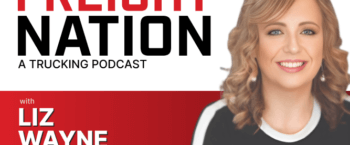How to Become a Freight Broker: Simple 11-Step Guide

Ready to become
a freight broker?
Let us help you navigate the nitty-gritty.
Freight and shipping in the U.S. is almost an $800 billion industry, and a freight broker plays a key role in managing the millions of loads transported each year. Freight brokers help connect truckers to consistent work while assisting shippers in securing the most cost-effective means of transporting their goods to their intended destinations.
As demand for carriers grows and the logistics industry becomes more sophisticated, there is a real opportunity to carve out a profitable career as a successful freight broker. If you have a passion for logistics, a knack for solving problems, and a good mix of people, practical, and organizational skills, then freight brokering could be the right industry for you.
Learn how to start a freight brokerage business, the average salary for a freight broker, and the types of licensing and insurance freight brokers need.
What does a freight broker do?
A freight broker’s responsibilities include:
- Monitoring carrier capacity
- Matching shippers and carriers
- Vetting and onboarding carriers
- Monitoring carrier compliance and licensing
- Managing the logistics of shipping and receiving
Freight brokers can often work from home, set their own hours, and earn a generous salary plus commission.
What’s the difference between a freight broker and a freight agent?
A freight broker has their own broker authority, is licensed and insured, and can legally arrange the movement of freight. A freight agent can coordinate freight movement only under the operating authority of a broker. And whereas freight brokers earn a salary plus commission, freight agents typically work on commission only, based on the dollar value of freight contracts they negotiate for brokers.
How does a freight broker make money?
Freight brokerage is the business of connecting shippers and carriers. When a company has a load they need to move, they often post that freight job to a load board, which is where carriers can search for, bid on, and accept loads.
A freight broker makes money by assisting in load matching — helping the shipper find the right carrier at the right price. Because shippers generally save money by reaching out to the marketplace for competitive rates, and carriers earn more money and spend more time on the road by relying on brokers to post loads, the entire process is more efficient and cost-effective for everyone.
The average freight broker salary in 2023 was $67,419, with the highest salary around $160,000. That’s before bonuses and many freight brokers also earn commissions.
How to start a freight broker company: 11 steps
The path to becoming a freight broker is relatively straightforward.
1. Start with proper training.
While there are no legal requirements for broker training programs, it’s important to have a good knowledge of the industry if you want to have a successful business. Prior experience in freight and logistics as a trucker, logistics manager, or dispatcher is a major asset. If you don’t have that background, take freight broker training courses to get a foundational understanding of the industry.
Many online training classes for freight brokers are self-paced and allow up to 6 months for you to complete your training. These courses educate prospective brokers on transportation types, regulations, recordkeeping, rate-setting, and other aspects of the job. Some training programs may also provide templates for contracts, invoices, and other documents you’ll need as you form your freight brokerage business.
One of the best ways to get hands-on experience quickly is with a freight brokerage business as an entry-level freight broker. Earning a salary while learning the ropes will set you up well for step two.
2. Choose a business name and register your broker company.
Choose a business name that helps identify what you do and is easy to market. Once you have a short list of names, check them on www.uspto.gov to see if they’re available, and you’re well on your way to applying for broker authority.
Most states allow businesses to register their name at the same time they register their business entity. You’ll need to decide if you want to register your freight broker business as a sole proprietor, partnership, or a limited liability corporation (LLC).
A sole proprietorship is simple to set up, as is a partnership if you’re going into business with other people. However, both of those structures can expose your personal assets to any financial liability that might come up from operating your business. An LLC, however, shields your personal assets from business-related liability.
3. Apply for freight broker authority.
A freight broker registering for the first time must do so through the Federal Motor Carrier Safety Administration (FMCSA) Unified Registration System to get a motor carrier authority. This is a requirement for becoming a licensed freight broker.
Each application costs $300. (You can submit both on the same form, but you’ll still need to pay a total of $600.) If you apply online, submitting form OP-1 will get you a grant letter and motor carrier (MC) number immediately. These documents are your notice that a freight broker license application is underway, but they are not an authorization to operate. You must still complete several steps before becoming a freight broker, including getting the required insurance and surety and choosing process agents for each state you plan to operate in. (More on that below).
4. Select a process agent for your brokerage.
A freight brokerage business must have a process agent in each state where it operates. The process agent is the person who will receive legal documents or process documents on behalf of the freight brokerage in any legal proceedings brought against it. Process agents must have a physical location (P.O. boxes are not acceptable). You can find a list of agents on the FMCSA website.
You can act as your own process agent in the state where you live. You can also hire one to work for your company as a salaried employee, or use one of the many process agent services available. These agents charge fees for their service.
5. Acquire a surety bond.
In 2013, the federal government increased the mandatory freight broker bond from $10,000 to $75,000. Depending on your personal credit and financial health, the bond can cost $750 to $9,000 per year, and brokers are required to pay the full premium up front. The good news is that some bond companies offer financing that allows brokers to pay for their surety bonds monthly.
Your bond company will give you a Form BMC-84 for your freight broker surety bond, which you need to submit to the FMCSA within 90 days of filing your OP-1.
6. Purchase contingent cargo insurance and general liability insurance.
While the federal government does not require these coverages, most companies will not allow a freight broker to operate on their behalf without contingent cargo and general liability insurance. This coverage protects your clients’ physical property and shields you from personal liability if a customer’s cargo is lost, damaged, or stolen.
Onboard with confidence
Take a deep dive into risk mitigation for freight brokers.
7. Check your state’s corporate and tax regulations.
Even with your freight brokerage operating authority and freight broker license, you still need to make sure your company follows all state regulations. Those might include business registration requirements or taxes. Make sure you understand what records you need to keep and any filing or other requirements in the areas where you operate.
8. Develop a business plan.
On the face of it, freight brokering is relatively simple: Contract with company A to organize shipping of their load, contract with company B to haul the cargo, profit on the difference between what A pays and B charges. But there’s a lot more to consider as you develop your freight broker business plan.
How will you manage the gap between money going out and money coming in? How will you cover your startup costs for equipment, insurance, and licensing? When and how will you repay any business loans?
If you’ve worked for a brokerage or in another role in the freight and shipping industry, you might have developed contacts and built a network of shippers and carriers. How will you begin reaching out to them to build your business?
Your business plan should account for all those issues. Set clear targets for growth and revenue and achievable milestones. Set regular check-in points so you can make sure you are on schedule with your plan.
9. Set up financing
If you have cash reserves on hand, you may be able to float the cash flow of your new business without help. But not everyone is in that position, and truckers will need to be paid before the shipper has paid you for your services.
Getting a line of credit from a bank can help. With a clear understanding of your first few months of operating costs in place, you can approach financial institutions for a business loan or line of credit. They may secure the funding against your personal assets, or you may need the business plan we detailed above in order to show your company’s viability. With funding in place, you can start operating your business.
10. Finalize your broker contracts.
Now’s when your experience or education comes in handy. If you took a freight broker training course, you might have gotten document kits that you can now use to carry out your business.
You’ll need to set up and maintain contracts with shipping companies and carriers, and keep track of your shipping records and proof of your qualifications. It’s good to have a lawyer look over the forms and contract templates you use to make sure they’re appropriate for your freight broker company.
11. Find shippers and carriers and set rates
The best way to connect loads to trucks is with a load board. Online load boards like Truckstop give you access to thousands of shippers, trucks, and drivers You can also use the boards to research cargo rates in the shipping lanes you intend to operate in.
Start brokering freight.
So now you’re licensed, your business is set up, your insurance is in place, your documents are ready, and you’re ready to hit the ground running.
You can use a board like Truckstop to post loads and to manage your jobs. And, because Truckstop updates in real time, you can see available trucks and drivers the moment they post online — and respond quickly. The more hauling jobs you broker, the faster your business grows.
As you work with more satisfied customers on both sides of the industry, your ratings will improve. Shippers and carriers also use Truckstop to vet and identify quality brokers, giving you an edge for growing your business.
Contact Truckstop for a demo and choose your load board today to get started!
Tune in to
Freight Nation: A Trucking Podcast.
Listen in as seasoned brokers share practical knowledge.
Topics:

Find out how our platform gives you the visibility you need to get more done.
Get helpful content delivered to your inbox.
Schedule a demo.
Find out how our platform gives you the visibility you need to get more done.





